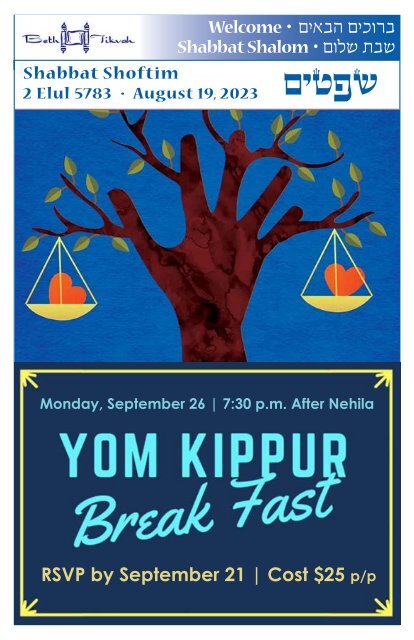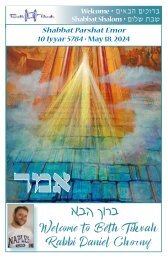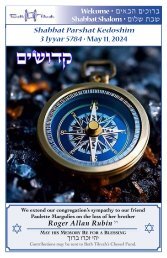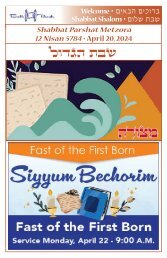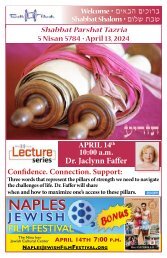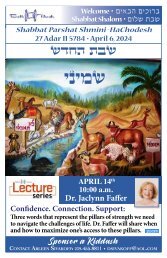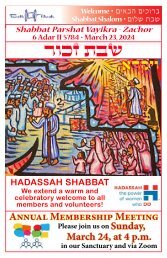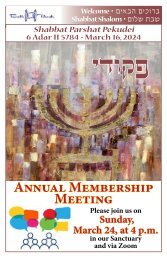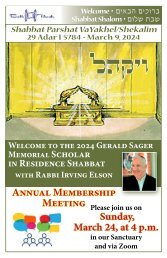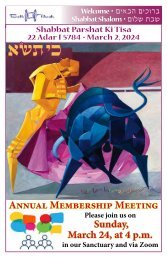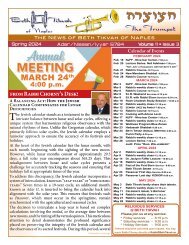Create successful ePaper yourself
Turn your PDF publications into a flip-book with our unique Google optimized e-Paper software.
Shabbat Shoftim<br />
2 Elul 5783 • August 19, 2023<br />
Welcome • ohtcv ohfurc<br />
Shabbat Shalom • ouka ,ca<br />
ohypa<br />
Monday, September 26 | 7:30 p.m. After Nehila<br />
RSVP by September 21 | Cost $25 p/p
Yahrtzeiten<br />
120 sg<br />
vfrck oburfz<br />
Aug 18 • 1 Elul Sadie Rubenfeld – Relative of Susan Barad<br />
Perry Kaye<br />
– Fathert of Stuart Kaye<br />
Aug 19 • 2 Elul Benjamin Epstein – Father of Ruth Jason<br />
Ida Hecht<br />
– Mother of Larry Hecht<br />
Aug 21 • 4 Elul Robin Lewis Lebowitz – Sister of Ron Lebowitz<br />
Aug 23 • 6 Elul Max Ponter – Grandfather of Alan Rosenberg<br />
Birthdays<br />
Aug 19<br />
Aug 23<br />
Aug 25<br />
Anniversaries<br />
Shep Scheinberg<br />
Stuart Kaye<br />
Fran Alpert<br />
Aug 15 Donna & Alan Rosenberg (54)<br />
jna `skuv ouh<br />
Shabbat Kiddush Sponsored by:<br />
Mitchell Eil<br />
in memory of his father Dr. Harry Eil k”z<br />
Maven: Steve Chizzik<br />
Assisted by: Sue & Joe Hammerman,<br />
Elaine Kamin, Fran Kaufman, Shep & Linda Scheinberg<br />
cuy kzn<br />
Sponsor a<br />
Kiddush<br />
Contact Arleen Sivakoff:<br />
dsivakoff@aol.com • 239.455.8811<br />
“...rautn vhfnu`u vc ohehzjnk thv ohhj Jg”<br />
“She is a tree of life to those who embrace her;<br />
those who hold her tight are happy…”<br />
Remember Lunch-N-Learn with<br />
Rabbi Chorny life’s Tuesdays joys & celebrations<br />
12:15 P.M.<br />
Prov. 3:18<br />
Dedicate new leaves in commemoration of<br />
Please contact the Synagogue office or Harvey Rosenthal: HAROSENTHAL80@GMAIL.COM
Torah & Haftarah Readings:<br />
Shabbat Re’eh: Deuteronomy 16:18-18:5 (Etz Hayim p. 1088)<br />
1. 16:18-20 2. 16:21-17:7 3. 17:8-10 4. 17:11-13<br />
5. 17:14-17 6. 17:18-20 7. 18:1-5 M. 21:7-9 (p.1106)<br />
Haftarah: Isaiah 51:12-52:12 (p. 1108)<br />
Torah Commentary<br />
D’var Torah:<br />
You Ain’t Never Had a Prophet Like Me - Bex Stern-Rosenblatt<br />
Moses is unique. We read, at the very end of the Torah, right after the successful<br />
transfer of leadership from Moses to Joshua, that Moses is special - “But<br />
no prophet again arose in Israel like Moses, whom the LORD knew face-toface,with<br />
all the signs and the portents which the LORD sent him to do in the<br />
land of Egypt to Pharaoh and to all his servants and to all his land, and with all<br />
the strong hand and with all the great fear that Moses did before the eyes of all<br />
Israel.” Moses has a relationship with God that no one else will have and Moses<br />
had a job to do, an exodus to lead, that no one else will copy.<br />
Our parashah is Moses’s explanation of how we will function without him. He<br />
presents to us four overlapping branches of government, four types of leaders -<br />
judges, kings, priests, and prophets. Each of these types replaces part of Moses’s<br />
role. He is dividing his job up and making it more manageable by hiring more<br />
people. This division of labor is very much in line with the sentiment expressed<br />
at the end of the Torah - Moses is irreplaceable, it’ll take a whole group of people<br />
to do the job he did alone.<br />
Yet there is one verse in our parashah that seems to contradict this sentiment.<br />
We read, in Deuteronomy 18:15, “A prophet like me from your midst, from your<br />
brothers, the LORD will raise up. Him shall you heed.” Moses tells us that God<br />
will elevate a prophet like Moses himself. Yet the Torah ends by telling us this<br />
never happens. And in our parashah, Moses seems to be making arrangements<br />
so that a prophet need never again bear all the responsibilities alone for leading<br />
a nation that Moses bore. So what does Moses mean when he says that God will<br />
raise up a prophet like him?<br />
The context of the quote is Moses trying to explain to us how to recognize a<br />
true prophet. He makes clear that prophecy is something different from the<br />
abhorrent practices of soothsaying or practicing magic in which the Canaanite<br />
nations engage. We are given two signs for how to recognize a true prophet. The<br />
first is that a false prophet who pretends to speak in the name of God will die,<br />
although we are not given a timeframe for this prophet’s death. The second sign<br />
is that the things that a true prophet of God prophesizes will come true, while<br />
those of a false prophet will not.<br />
With this as context, Moses perhaps is explaining his own death and his own<br />
loyalty. Moses did in fact act as a prophet in a manner that was not sanctioned
y God. When Moses insulted the nation and struck the rock at Meribah, he<br />
seemed to be acting under God’s auspices while in fact he was transgressing<br />
them. For this, God condemns Moses to death, to not reaching the promised<br />
land. So when Moses says that God will raise up another prophet like him,<br />
perhaps he is being humble. That any prophet God raises up will be human,<br />
will be fallible, just as Moses has been. Of course, water did indeed come out<br />
from the rock, the second sign that Moses was a prophet held true. Even in the<br />
moment when Moses transgressed God, God did not abandon us to our thirst.<br />
Now, in Moses’s final speech, Moses lets us know that we are responsible for the<br />
actions of our prophets. A prophet is God’s messenger to us. But we are the ones<br />
who are able to choose whether or not to receive that message. When Moses<br />
transgressed God, calling us out as rebels, perhaps we should have stood up and<br />
rejected that message. If Moses, the best of prophets, can fail, then all prophets<br />
can fail. All prophets can be like Moses. It is up to us and the other balances on<br />
prophetic power to determine right and wrong, to find truth even when it is<br />
hidden in human foibles.<br />
5784 – 2023-2024<br />
Selichot with Cantor Brody<br />
Saturday, September 9 th – 8:00 p.m.<br />
Rosh Hashanah<br />
Friday, September 15 th – 6:15 p.m.<br />
First Day:Saturday, September 16 th – 9:00 a.m.<br />
Second Day: Sunday, September 17 th – 9:00 a.m.<br />
Yom Kippur<br />
Kol Nidre: Sunday, September 24 th – 6:00 p.m.<br />
Monday, September 25 th – 9:00 a.m.<br />
Yizkor – 11:30 a.m.<br />
Please send your High Holiday Forms ASAP<br />
Beth Tikvah of Naples<br />
1459 Pine Ridge Road<br />
Naples, FL 34109<br />
239 434-1818<br />
Visit us online at<br />
bethtikvahnaples.org<br />
or scan the QR code<br />
to go there directly


